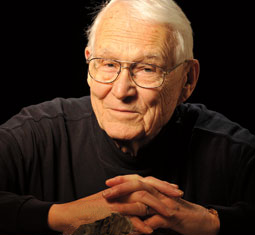James Short Jr. leaves behind research legacy

James Short Jr., who served as founding director of the Social and Economic Sciences Research Center, has passed away at 93.
May 31, 2018
James Short Jr., the founding director of WSU’s Social and Economic Sciences Research Center, passed away at 93 on May 13.
Short became a WSU faculty member in 1951 and taught until 1997, according to the College of Arts and Sciences. After his retirement from teaching, he served as a graduate student mentor and continued to take part in research, where he focused on delinquency and illegal acts, a field he has pioneered in his development of research methodology and research on the conditions under which crime occurs.
He founded the WSU SESRC in 1970 under the presidency of WSU’s seventh president Glenn Terrell, who identified the need for accurate information about people’s attitudes on campus. The center began as a hub for campus surveys in an effort to gauge the opinions of faculty, students and staff, according to their website. Since then, they have provided research consultation, training and other services meant to assist with research.
Before he was a famed sociological researcher, Short was a U.S. Marine stationed in Japan at the conclusion of World War II. Following the end of his service, he attended the University of Chicago, where he earned his doctorate. Wallis Beasley, then-chairman of WSU’s department of sociology, hired Short immediately after he finished his time at UC.
In 1964, Short became the dean of the WSU graduate school, a position he filled until 1968. The same year, United States President Lynden B. Johnson named Short as a co-director for the president’s Commission on the Causes and Prevention of Violence. Two years later, he founded the SESRC, or the WSU Survey Research Center, as it was known then.
Short helped led a study exploring gang behaviors in Chicago in the 1960s in an attempt to compare young gang members to other young males who weren’t involved in gang activity. His research was the basis for the textbook “Group Process and Gang Delinquency.” Short’s career spanned over 60 years, during which he authored more than 100 works.
Short told the WSU Magazine in 2010 that he still fondly looks back at the research.
“I just find it fascinating,” he said to the WSUM. “Here I am, more than half-a-century after these data were collected, enjoying analyzing.”
Throughout his career, Short received numerous honors for his work. A former president of both the American Society of Criminology and the American Sociological Society, he was also named a fellow at the American Association for the Advancement of Science.
In 2009, WSU rededicated Wilson Hall to Wilson-Short Hall in his honor. Other awards given to Short during his career at WSU included the President’s Faculty Excellence Award for Research in 1987, the President’s Award for Lifetime Service in 2006 and the Outstanding Service Award from the WSU Foundation in 2002. The American Sociological Association created the “James F. Short Jr. Best Article Award” in his honor in 2000.
Short’s family has requested all gifts be given to the James Short Distinguished Professorship fund or the new Jordan Schnitzer Museum of Art. The department of sociology at WSU will accept cards, and Kimball Funeral Home have not released plans for his memorial service.



















